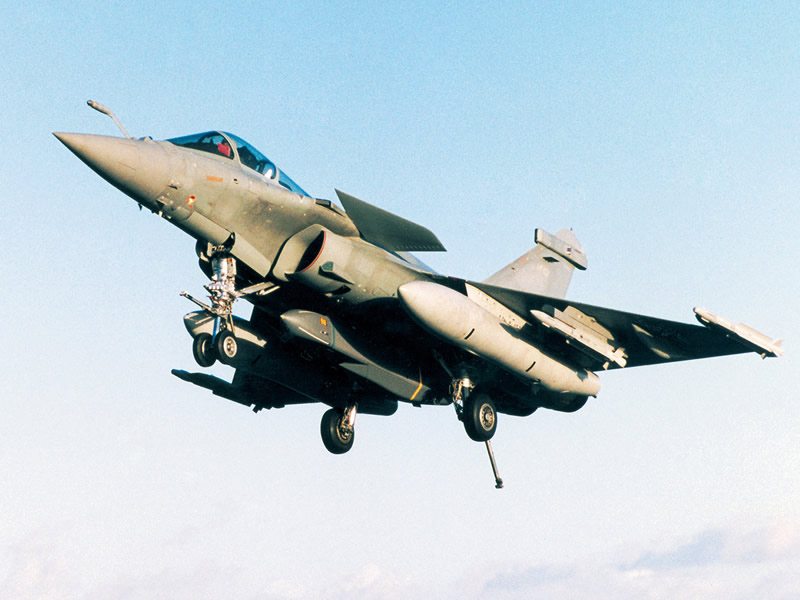India’s multi-billion-dollar deal to buy 36 fighter jets from France will cement strategic political ties between the two countries at a time when both are looking to kickstart their economies, experts say.
Indian Prime Minister Narendra Modi, in his first trip to France, said Friday he had ordered the 36 “ready-to-fly” Rafale jets as part of a push to modernize his country’s aging warplane fleet.
The announcement put to rest intense speculation over the fate of the contract, which was first signed in 2012 but had been bogged down by questions of cost and New Delhi’s insistence on assembling a portion of the high-tech planes in India.
It also comes as Modi is seeking to curry up interest from investors during his maiden trip to Europe, where he is seeking to rewrite India’s reputation as a tricky place to do business.
“Such major deals are never purely commercial, they are a part of a larger government strategy,” Mrinal Sumant, a retired army major general and procurement specialist, told AFP.
“It’s a decision based on the geopolitical and strategic interests of the two countries.”
India, which has long been the world’s largest buyer of defence equipment, is in the midst of a multi-billion-dollar upgrade of its Soviet-era military hardware in the face of antagonistic neighbours Pakistan and China.
Several Western countries have been courting New Delhi for big-ticket military contracts as it goes on a defence shopping spree.
But the win is particularly important for France, which is struggling with anemic growth, sky-high unemployment and an enormous debt pile. The new deal is expected to earn manufacturer Dassault over five billion euros ($5.3 billion) — its biggest-ever international order.
Perhaps more important is a touted contract for French nuclear giant Areva to install six reactors in India’s western state of Maharashtra, an agreement which is still waiting for approval five years after a bilateral civil nuclear accord.
French President Francois Hollande said he was “deeply moved” by the jets sale and that it would take the partnership between the two countries “into a new gear”.
“The equipment (jets) now carries a certain sovereign guarantee which is very reassuring (for India),” said Sumant.
“The deal will go a long way in strengthening their ties and the positives would overflow into other sectors as well.”
‘Make in India’
The original tender, which is still under negotiation and now estimated to be worth $20 billion, included 18 fighter jets in fly-away condition and 108 to be made operational by India’s Hindustan Aeronautics.
Amber Dubey, a defence expert with global consultancy KPMG, said “the goodwill created (from the Rafale deal) can be used to settle the pending issues (in the larger deal) in a win-win manner”.
It could also provide a bargaining tool in future negotiations as Modi, who stormed to power last May on pledges of economic reform, seeks to accelerate his drive to turn India into a manufacturing and investment hub.
“The Indian government may also expect a reciprocal gesture from the French government on their ‘Make in India’ initiative beyond just the Rafale deal,” Dubey was quoted as saying in the Mint newspaper.
While Modi has pledged to push forward with international military purchases, which stalled under the previous administration, he has vowed the upgrade of India’s army will also benefit the home-grown defence industry.
The premier wants domestically made equipment to account for 70 percent of the procurement budget within five years, up from the current 40 percent, under his “Make in India” initiative.
While the nitty-gritty of the new jet sale remains unclear, local media said it included a memorandum of understanding on joint defence production in India.
“The reworked deal… has the potential to pump in at least $2.3 billion into the Indian defence manufacturing sector,” the Times of India daily said, adding that it could offer Indian companies “lucrative contracts for maintenance and overhaul of the jets”.
Defence analyst Rahul Bedi lauded the “clever” move to buy the jets directly from France, overriding commercial agents.
“Modi… has managed to invoke the operational necessity for the jets while ensuring his ‘Make in India’ program remains relevant,” Bedi, from IHS Jane’s Defence Weekly, told AFP.










